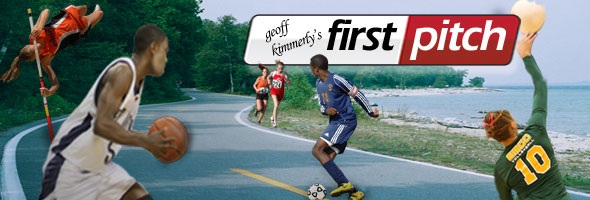
Did you lose this medal?
By
Geoff Kimmerly
MHSAA.com senior editor
August 19, 2013
It’s not quite a needle in a haystack. But it could turn into a great story.
This 1984 MHSAA Regional medal, pictured above, was found recently in Massachusetts with a metal detector. The finder, coincidentally a former collegiate track and field coach, hopes to return the medal to its rightful owner.
 Doing so might not be as difficult as it sounds, but we’ll need help from our friends in the track and field community.
Doing so might not be as difficult as it sounds, but we’ll need help from our friends in the track and field community.
Here’s what we know:
- The medal was received for finishing fourth in the 800 meters at a Class B Regional in 1984.
- The Regional had to be in the Lower Peninsula, because Class A and Class B were and continue to be combined in the Upper Peninsula.
- There were 10 Class B Regionals during the 1984 season, hosted by Sturgis, Parma Jackson County Western, Chelsea, Warren Fitzgerald, Linden, Corunna, Ovid-Elsie, Fremont, Greenville and Gaylord.
- So that means the medal could have only 20 possible owners.
Unfortunately, we do not have Regional results from the 1980s on file in our office. That’s where our helpers come in.
If you have results, or any idea who won this medal, please contact me at [email protected]. If we can connect medal with owner, we’ll tell much more of this story – including that of the coach who found it and made the call to start its return trip home.

NFHS Voice: Give Thanks for Officials
February 19, 2020
By Karissa Niehoff
NFHS Executive Director
While the behavior of parents and other fans at high school games is still a work in progress, there is some good news on the officiating front.
Last fall, we reported on a growing shortage of officials nationwide – even reaching a crisis stage in some areas as games were being cancelled. Through a nationwide recruitment effort, progress is being made in attracting more people to the high school officiating avocation.
Thanks to the NFHS’ #BecomeAnOfficial campaign that was launched in the spring of 2017, more than 4,000 men and women across the country have registered and become certified officials. Many of these individuals are former high school athletes who want to remain involved in sports, earn some extra income and stay in shape, including first responders such as police officers, firefighters and EMTs.
On the flip side, however, is the fear that any gains in new officials coming in the front door are being offset by other officials heading out the back door because of the continued boorish behavior on the part of parents and other fans.
Rickey Neaves, associate director of the Mississippi High School Activities Association, is struggling to cover all basketball games in his state in his role as officials’ coordinator.
“Fans and coaches alike feel freer to downgrade officials, and holler and scream at them, as opposed to the way it was 10 years ago,” Neaves said. “You can see where it is getting worse and worse with parents and coaches blaming officials or staying on an official to the point where they’re just not going to take it, so they just get out.”
Unfortunately, we continue to hear reports like this from across the country. A recent survey conducted by Officially Human: Behind the Stripes that was completed by about 19,000 respondents in 14 states indicated that the problem persists, with fans who do not know the rules being the main culprit.
If efforts by the NFHS at the national level – and others at state and local levels – to attract more people to officiating are to be successful, unsportsmanlike behavior on the part of parents and other fans must cease or we will lose some of these new officials within two years.
While we recognize the task of improving the culture at high school events is challenging and is one more item on the busy plates of school administrators, it is essential if we are to retain officials.
Brenda Hilton, founder of Officially Human: Beyond the Stripes, said, “The time is now for all of us to realize that officials are human and their existence and hard work at sporting events allows all of us to enjoy the games that we love. We must start to humanize officials now before the whistles fall silent.”
Recognition and thanks should also be a part of the game plan. We must regularly share our appreciation for the men and women who officiate high school sports.
Dana Pappas, commissioner of officials for the New Mexico Officials Association, shared the following with officials in her state during a special appreciation week:
“Never think that what you do as an official doesn’t matter because it does. Never let one contest where the fans are exceedingly brutal and the scrutiny is overly intense derail your love for what you do. Never think that you are not making a difference because you most definitely are. You are educators, role models and guardians of the integrity of the sport you officiate. You officiate because you care about kids, you care about your chosen sport and you care about your community.”
Instead of viewing these officiating issues as a crisis, let’s see them as an opportunity to impact lives through education-based athletics.
Dr. Karissa L. Niehoff is in her second year as executive director of the National Federation of State High School Associations (NFHS) in Indianapolis, Indiana. She is the first female to head the national leadership organization for high school athletics and performing arts activities and the sixth full-time executive director of the NFHS, which celebrated its 100th year of service during the 2018-19 school year. She previously was executive director of the Connecticut Association of Schools-Connecticut Interscholastic Athletic Conference for seven years.

